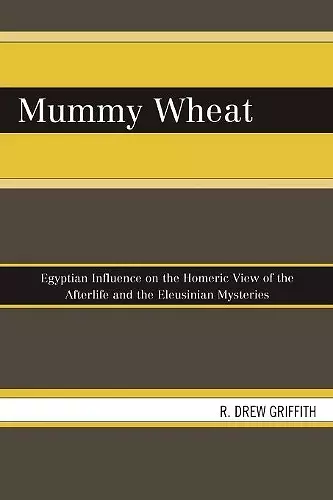Mummy Wheat
Egyptian Influence on the Homeric View of the Afterlife and the Eleusinian Mysteries
Format:Paperback
Publisher:University Press of America
Published:18th Sep '08
Currently unavailable, and unfortunately no date known when it will be back

Homer presents a world-view in which death represents the end of consciousness and total annihilation of personhood. Yet in Odyssey, Book Four, he contradicts this by saying that one man at least will not die, but will be transported to Elysium, where he will have a blessed existence forever. In Mummy Wheat R. Drew Griffith argues that this shocking violation of Homer's normal world-view comes from Egypt, where more than anywhere else in the ancient world people firmly believed in life after death. This Egyptian view entered Homer deeply enough that traces of it can be found in many facets of his poetic language. Finally, Griffith argues, the Elysium idea did not die with Homer, but became enshrined in one of the most influential and long-lived religious traditions of Greece: the mysteries of Demeter at Eleusis outside of Athens.
Importanttttt * Bryn Mawr Classical Review, April 2009 *
Since the 1990s consideration of Egyptian etymologies has opened up in the West, and such younger classicists as Garth Alford, Erwin Cook, and R. Drew Griffith have begun to study striking similarities between Egyptian and Homeric imagery and vocabulary. -- Martin Bernal, author of Black Athena: The Afroasiatic Roots of Classical Civilization Volume III The Linguistic Evidence
Since the 1990s consideration of Egyptian etymologies has opened up in the West, and such younger classicists as Garth Alford, Erwin Cook, and R. Drew Griffith have begun to study striking similarities between Egyptian and Homeric imagery and vocabulary. -- Martin Bernal, author of Black Athena: The Afroasiatic Roots of Classical Civilization Volume III The Linguistic Evidence
Important * Bryn Mawr Classical Review, April 2009 *
ISBN: 9780761842989
Dimensions: 231mm x 154mm x 20mm
Weight: 408g
272 pages